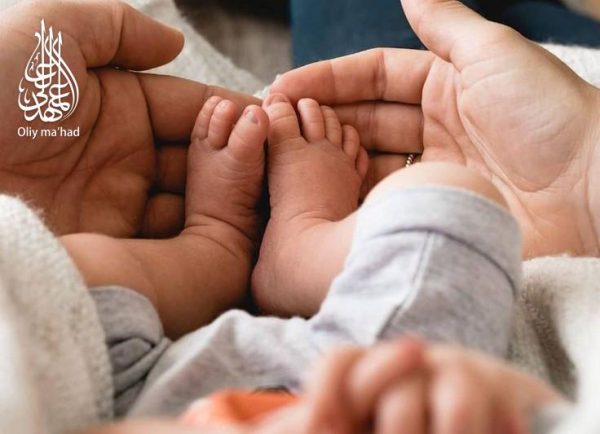Marriage is a vital need for people. Peace and happiness are supported in the family. A person, who travels the world to find well-being, finds it only in the family. A family is a garden and a child is the most beautiful flower there. The smile and laughter of this little creature is the greatest joy in the family. The smell of a child is smell of paradise. How important is water and light for the flower’s maturity, perfection, and unique aroma.
This means that both a father and a mother have a unique role in parenthood, in becoming of a child a perfect person and being beneficial with his knowledge in the family, society, country, and in the whole world.
Unfortunately, it is not always possible to control the situation. This sacred bond – a family is sometimes broken, whether we want it or not, despite the tears of children, parents sometimes divorce.
Who stays with a child after divorce?
According to our Shari’ah, bringing up of a child is given to a mother, because women are more compassionate and patient than men. A mother of a child is the first woman who has the right of a guardianship. The Prophet (peace and blessings be upon him) said to a woman who complained, that her husband was going to take her child from her whom she had suckled and brought up: “It is your right to take a child until you marry”. (Narrated by Abu Dawud, Bayhaqi and Hakim)
According to Hanafi and Shafi madhhab, those who are deserving of bringing up a child after his mother are his both grandmothers, his sister and then his mother’s sister. This means that if a child has no parents, he is taken care by his grandmothers and aunts.
If there are no other caregivers for a child, a mother must look after a child. If there are other caregivers, a mother’s responsibility to look after the child is gone. If a mother marries, she loses the right to be the first caregiver.
A man who wants to marry a woman does not have to accept her children. If children have no other caregivers, it becomes obligated for him to care them. Otherwise, a child is likely to be lost. The same is concerning women too. It is her right to accept her husband’s children or not. A wife has to look after children if they need care and there is no one else. She adopts children or she does not marry.
A father pays allowance for a child in spite of the fact who takes care of him. If a mother is poor, she consumes this allowance with her child. If a child does not have a father, a child’s wealth is spent. If a child does not have wealth, a person who takes care of a child has to pay allowance for him.
A little girl is given to her mother who is married to another man, or she may be given to her mother’s aunt or her father’s sister. A boy who reaches seven years and a girl who reaches puberty can be given to their father. If they do not have a father, they can be given to their uncle who is not (fasiq) a sinner.
When it comes to divorces in the families with children, there is no consensus on who will take care of a child. Therefore, decisions are made by judges. Guardianship includes a number of duties of parents in taking care, protection, support, and education of a child.
Main features in guardianship of a child
Specialists who decide who will adopt a child should take into account the interests of a child. When the interests of a child are restored, it is important to consider which of the parents can secure his future best. Indeed, it is important whom a child chooses.
On the one hand, the age of a child plays an important role whom the right of bringing up is transferred. Because giving a child, who needs mother care, to a father may cause to harm him both physically and mentally. We must also realize that during this period a baby is in great need of mother’s compassion.
In most countries around the world, it is accepted that children under the age of 3 are absolutely in need of maternal care. Deciding on the upbringing of a child up to the age of 3 does not matter what the mother’s job, home or salary is, or even how she lives. The Supreme Court almost always orders a mother to bring up children of this age.
Children of the ages between 3 and 7 need the care of their mother less. And we have to accept this as relative. A child is rarely given to his father at this age. For example, if a mother may harm her baby, or she is unable to look after a child, or in poor health, may cause a child to be given to his father. Here, it is important to make decisions based on the best interests of a child.
While the age is still an important factor in the appointing the guardianship of a child of the ages between 6-12, the financial opportunities also become more important. Naturally, by this time, an environment that provides qualitative education, mature parenting and a healthy future for a child starts to play an important role. When choosing a parent, of course, it is very important for judges to take into consideration these factors. Especially when it comes to caring of a child at this age, we think it is advisable to involve a psychologist who knows his field. A specialist talks to a child and learns about his / her spiritual and mental state and listens to his thoughts. In this case, we may also use a child’s personal judgment in the decision-making process.
It is a time of maturity for children at 12 and older. At this age, each child becomes a new world, a new personality. Especially, we can see the birth of children’s wishes clearly.
According to the United Nations Convention on the Rights of the Child, from the age of 12, judges are required to listen to the views of children on the matter of whose guardianship they will choose.
In conclusion, it should be noted that there are both qualities that should be taken from a mother and from a father. There is a saying in our nation that a mother gives birth to a child, and a father teaches him to live in this world!
When a mother develops such qualities as gentleness, kindness, politeness, chastity and self-esteem, a father motivates such qualities as courage, bravery, firmness, and self-confidence.
These measurements are, of course, in general. Whom shall we give a child?
If we give him to a mother, he will become handicapped in one side, but if we give him to a father, he will become handicapped in other side.
In both ways, parents and children will lose; it is as if a meal without salt or sugar.
Well, divorced parents, let’s look for the answer to that question in our child’s inner world:
Is a child yours or mine?
Let’s just be “CHILDREN ARE OURS”!
Nigora Usmanova, Teacher of the chair of “Faith and Islamic law subjects”
Translated by S.Valieva






